"Foolproof" with Sander van der Linden (BS 208)
/This month's episode is an interview with Cambridge Psychology professor Sander van der Linden, author of Foolproof: Why Misinformation Infects Our Minds and How to Build Immunity. We discuss the important topic of how techniques like appealing to emotion contribute to the spread of misinformation. Dr. Campbell reflects on why this topic is important.
Our discussion began with the problem of the “Illusory truth” effect, which is the observation that the more often something is repeated the more likely people are to believe it is true, even when its not. This can defeat attempts to debunk misinformation. Van der Linden explained how the “truth sandwich” provides the safest method of debunking based on our current understanding of how memory works.
Then we talked about the key features of Conspiracy theories, which form a rather extreme version of misinformation that seem to be immune to evidence. Van der Linden described how conspiracy theories seem to be driven by three psychological motives: the need for knowledge that makes sense of the world, social connections with other believers, and the existential need to make sense of uncertainty. The seven signs of conspiracy thinking are easy to remember using the mnemonic CONSPIRE: Contradictory thinking, Overriding suspicion, Nefarious intent, Something must be wrong, Persecuted victim, Immunity to Evidence, Re-interpreting randomness.
Unfortunately mis-information really does spread more quickly than the facts. This is partly because it has characteristics that encourage its spread: novelty, appeal to emotion, appeal to morality, and being provocative. Another problem is that anti-science messages tend to be more interconnected since they interact with a wide variety of pseudoscientific sources.
It is clearly impossible to eliminate misinformation, which is why researchers like van der Linden are exploring the idea of mental immunity, which means teaching people to recognize the techniques and hopefully view information more critically. He described how his team has created video games that help “immunize” players against the classic tools of misinformation and propaganda including false dichotomies, scapegoating groups of people, polarizing, the use of emotions, impersonating or using fake experts. He closes with techniques that we can all use, even in everyday conversations. Of course, he emphasized the importance of being non-confrontational, since that almost never leads to the desired outcome.
Listen in your Favorite Audio app: Audible, Amazon music, Pandora, Spotify, YouTube and many more.
Links and References:
Foolproof: Why Misinformation Infects Our Minds and How to Build Immunity by Sander van der Linden
Sander van der Linden, Phd (University of Cambridge)
Learn more via video games at https://inoculation.science/
Please visit http://brainsciencepodcast.com for additional references and episode transcripts.
Announcements:
Please take a few minutes to complete this audience survey.
The mobile app has been updated and is now called Brain Science Podcast. The app is free and MyLibsyn Premium subscribers can use it to access transcripts and other premium content.
Dr. Campbell's move to New Zealand has been delayed, but she hopes to be in Auckland by July 2023. Please reach out if you live in New Zealand or Australia.
Please subscribe or follow Brain Science in your favorite audio app and please share it with others.
Get free gift "5 Things You Need to Know about YOUR Brain when you sign up for the free Brain ScienceNewsletter to get show notes automatically every month. You can also text brainscience to 55444 to sign up.
Check out the Brain Science podcast channel on YouTube
Support Brain Science by buying Are You Sure? The Unconscious Origins of Certainty by Virginia "Ginger" Campbell, MD. (Autographed copies are available)
Learn more ways to support Brain Science at http://brainsciencepodcast.com/donations
Connect on Social Media:
Twitter: @docartemis
Facebook page: http://www.facebook.com/brainsciencepodcast
Contact Dr. Campbell:
Email: brainsciencepodcast@gmail.com





